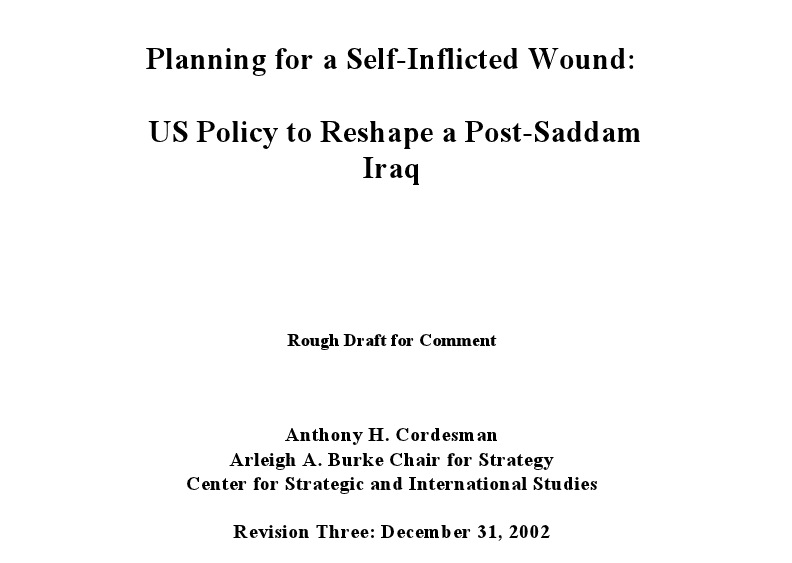I watched Condoleeza Rice before the Senate Foreign Relations Committee yesterday, the day after the hearing took place. (On: CSPAN; video linked on page)
Although it would be easy to glibly remark how many whacks both Democrats and Republicans took at her, and, tell of how many seemed to land squarely, my deeper response–to tell of it–was a deep sadness for her.
Her talents have been just about completely devoured by the hungry appetites of those who, almost literally, are her keepers. Some commentators praised her for ‘keeping her cool,’ whereas I understand, to paraphrase the psychologist Marion Woodman, that Condy’s “soulfeeling” has been wiped away by her being in unconscious thrall to the demonic potency of those same keepers.
I wanted her to run far away from her prison and prisoners.
Arthur Silber, two excerpts.
I. (originally written February 2006) Walking into the Iran Trap, Conclusion (A): Folly Marches On — and Seeking a New Direction
The continuation of this policy to any extent at all is indisputably counterproductive and self-defeating; to broaden it still more surely brings it entirely within Barbara Tuchman’s definition of “folly.” From the first chapter of her book, “Pursuit of Policy Contrary to Self-Interest”:
Misgovernment is of four kinds, often in combination. They are: 1) tyranny or oppression, of which history provides so many well-known examples that they do not need citing; 2) excessive ambition, such as Athens’ attempted conquest of Sicily in the Peloponnesian War, Philip II’s of England via the Armada, Germany’s twice-attempted rule of Europe by a self-conceived master race, Japan’s bid for an empire of Asia; 3) incompetence or decadence, as in the case of the late Roman empire, the last Romanovs and the last impeial dynasty of China; and finally 4) folly or perversity. This book is concerned with the last in a specific manifestation; that is, the pursuit of policy contrary to the self-interest of the constituency or state involved. Self-interest is whatever conduces to the welfare or advantage of the body being governed; folly is a policy that in these terms is counter-productive.
To qualify as folly for this inquiry, the policy adopted must meet three criteria: it must have been perceived as counter-productive in its own time, not merely by hindsight. This is important, because all policy is determined by the mores of its age. “Nothing is more unfair,” as an English historian has well said, “than to judge men of the past by the ideas of the present. Whatever may be said of morality, political wisdom is certainly ambulatory.” To avoid judging by present-day values, we must take the opinion of the time and investigate only those episodes whose injury to self-interest was recognized even by contemporaries.
Secondly a feasible alternative course of action must have been available. To remove the problem from personality, a third criterion must be that the policy in question should be that of a group, not an individual ruler, and should persist beyond any one political lifetime. Misgovernment by a single sovereign or tyrant is too frequent and too individual to be worth a generalized inquiry. Collective government or a succession of rulers in the same office, as in the case of the Renaissance popes, raises a more significant problem.
Bush is an exceptionally terrible president in numerous ways, including his relentless attacks on individual rights and civil liberties domestically. I have no doubt that the particular combination of errors that Bush represents, and the fundamentality of the nature of those errors with regard to the principles underlying our form of government, will forever keep him among the five or ten least-regarded of American presidents (and perhaps at or near the very bottom, depending on what happens over the next few years).
But as I indicated above, in terms of his foreign policy, Bush falls firmly within a tradition that extends back for more than 100 years. The Bush administration may be close to indescribably incompetent and bumbling in its execution, but the interventionist approach is far from unique to this presidency. I discussed in Part V the extent to which Bush has revived the Wilsonian approach to intervention abroad: both presidents employed the same kinds of appeals to “ideals” and overarching moral principles. Both sought to transform the world, and both failed, except to the extent the transformation was the opposite of what they had intended. And of course, the fifth chapter of Tuchman’s book is entitled, “America Betrays Herself in Vietnam” (and see Tuchman on Vietnam below). This is a policy of long duration, one that encompasses both Democratic and Republican administrations. Moreover, and I will have more to say about this when I address Iran specifically, we now have prominent national Democrats who are taking a harder line on Iran than Bush himself. This is a national tradition that has swallowed up almost all political leaders, with only a handful of exceptions. Party partisanship is no cure here; it is a central part of the problem. These errors are not confined to one part of the political spectrum; would that they were.
As I have suggested in earlier parts of this series, this policy of interventionism arises in large part from the national myths that form a significant part of our country’s conception of itself. All of us grow up in this cultural atmosphere, and it influences our world perspective in innumerable ways.
II. (originally written February 2006 Walking into the Iran Trap, V: Flashback: Endless War, and the Destructive Search for “Meaning”
But I will continue in my attempts to convince more people that it is crucial to appreciate the larger forces at work. When we consider that conflict and war constitute the overriding, unending theme of human history — and when we realize that those wars were frequently viewed in retrospect, even by those who were largely responsible for them, as entirely futile and as having resulted in immense destruction and loss of life for no worthwhile purpose — we must wonder why we are so eager to repeat this tragic history over and over again. Political considerations alone cannot explain this willingness of so many people to act in ways that are, in the end, profoundly self-destructive.
I have suggested some of the roots of this enthusiasm for war in Part III of this series, when I discussed Chris Hedges’ observations about the “mythic reality” of war. Hedges notes that: “In mythic war we fight absolutes. We must vanquish darkness. It is imperative and inevitable for civilization, for the free world, that good triumph…” What is crucial is that this is always how conflicts are viewed and justified — even when it is patently obvious that such absolute terms of good and evil are utterly inapplicable.
If we are concerned with tracing the broad outline of modern history and determining exactly how we have arrived at the international conflicts that confront us today, we always end up examining once again the first conflict where so much of it began: with World War I. I traced some of the broader world consequences of The Great War in Part II, The Folly of Intervention. I’m still going through the archives of old essays that I’ve saved, and reposting those that are most relevant to the issues I’m discussing. I recently came across a post I had entirely forgotten, from October 31, 2004.
Here is how that entry began (with a few bracketed comments added for clarity):
In a post the other day, I spoke of World War I as the seminal event leading to the endless reign of horror in the twentieth century:
“Of course, the West more generally has been central to developments in the Middle East since World War I, as I noted [in a still-earlier post], referring to David Fromkin’s invaluable book, A Peace to End All Peace. When one considers the long arc of history, it cannot be disputed that all the major conflicts of the twentieth century grew out of the events set in motion by The Great War, and particularly as the result of United States involvement in that conflict — an involvement which was entirely one of choice, and not of necessity. The role of the U.S. in World War I led to the rise of Soviet Russia, as well as to a peace which led to the rise of Fascist Italy and Nazi Germany. And the kind of “peace” that the United States allowed to take hold after World War II — when both Churchill and Roosevelt gave Stalin everything he wanted and more, thus ensuring that Soviet Russia was the only genuine victor of that terrible conflict — led directly to the Cold War, including the conflict by proxy with the Soviet Union in Afghanistan, which in large part led us to where we are today.
“The lesson of this history is unavoidable, and unforgiving: foreign intervention always leads to unforeseen and undesirable consequences (undesirable from the perspective of the commonly stated goals of the interventionists themselves, that is), and always leads to dangers greater than those that existed prior to the intervention. And thus the ground is prepared to “justify” still further intervention — which leads to the same results, ensuring that the cycle continues indefinitely, even as it exacts a greater and greater toll.”


